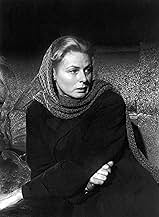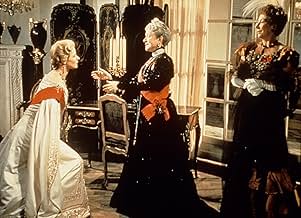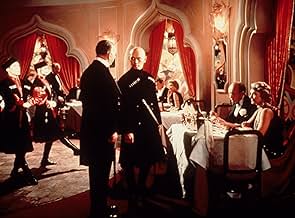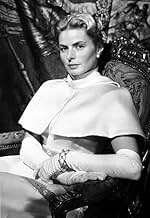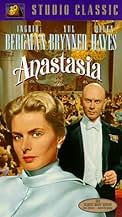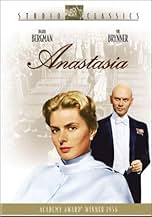CALIFICACIÓN DE IMDb
7.0/10
9.9 k
TU CALIFICACIÓN
Un empresario oportunista intenta hacer pasar a una misteriosa impostora como la gran duquesa Anastasia, y es tan convincente que hasta los más escépticos la creen.Un empresario oportunista intenta hacer pasar a una misteriosa impostora como la gran duquesa Anastasia, y es tan convincente que hasta los más escépticos la creen.Un empresario oportunista intenta hacer pasar a una misteriosa impostora como la gran duquesa Anastasia, y es tan convincente que hasta los más escépticos la creen.
- Dirección
- Guionistas
- Elenco
- Ganó 1 premio Óscar
- 7 premios ganados y 6 nominaciones en total
Sacha Pitoëff
- Piotr Ivanovich Petrovin
- (as Sacha Pitoeff)
Grégoire Gromoff
- Stepan
- (as Gregoire Gromoff)
Ina De La Haye
- Marusia
- (as Ina de la Haye)
John Adams
- Servant
- (sin créditos)
Paul Beradi
- Man in Bar
- (sin créditos)
Paul Bildt
- Bit Part
- (sin créditos)
Newton Blick
- Maître d'
- (sin créditos)
Ernest Blyth
- Ballet Patron
- (sin créditos)
- Dirección
- Guionistas
- Todo el elenco y el equipo
- Producción, taquilla y más en IMDbPro
Opiniones destacadas
As the woman who may or may not have been the Grand Duchess Anastastia, Ingrid Bergman was welcomed back with open arms by the Hollywood fraternity that had spurned her after her affair with Roberto Rossellini and she won her second Oscar for her performance. It is a fine piece of acting in a film that is all about acting; (Bergman plays a woman called Anna Koreff who is being groomed to pass as the Grand Duchess, though it is no "Pygmalion" as she may well indeed have been the person she is being hired 'to play', though DNA tests later proved the woman in question was not Anastasia).
Yul Brynner is the Russian general who acts as her Professor Higgins and he's excellent. The same year he won an Oscar for "The King and I" but his performance here is just as good. Helen Hayes is superb as the Dowager Empress and there is a terrific turn from the great Martita Hunt as the Empress' lady-in-waiting. Anatole Litvak's direction isn't exciting in 'cinematic' terms but he knows he has a good yarn and he moves it along at a cracking pace. Between them, Bergman, Brynner and Litvak hold you in thrall.
Yul Brynner is the Russian general who acts as her Professor Higgins and he's excellent. The same year he won an Oscar for "The King and I" but his performance here is just as good. Helen Hayes is superb as the Dowager Empress and there is a terrific turn from the great Martita Hunt as the Empress' lady-in-waiting. Anatole Litvak's direction isn't exciting in 'cinematic' terms but he knows he has a good yarn and he moves it along at a cracking pace. Between them, Bergman, Brynner and Litvak hold you in thrall.
8n-mo
"Anastasia" is not a film for everyone. Those who insist on historical accuracy in films depicting real people and events would do best to stay away from the movie house altogether. "Anastasia," however, is not exactly about real people, although it does incorporate the lives of real humans and parallels with their true stories to depict a compelling "what-if" scenario and this is incredibly effective, even after DNA tests have revealed that "Anna Anderson" was definitely not Anastasia Nikolavena Romanov but instead, in all likelihood a Kashubian factory worker. (I am unaware whether she ever used the name "Anna Koreff.")
As a matter of fact, those who are familiar with the real story are in for an even grander treat. We are thrown into 1928 Paris with a brief shot of this wretched madwoman at Russian Easter, lonely and rejected outside the Russian Orthodox Cathedral and on the brink of suicide, and we are definitely prepared to think of see as the impostor that "Anna Anderson" was. Yet as the film progresses, we are shown a woman quite literally without any past. Michael Thornton opined of the real "Anna Anderson," "Somewhere along the way she lost and rejected (Kashubian factory worker Franziska) Schanzkowska. She lost that person totally and accepted completely she was this new person."
Ingrid Bergman's Anna Koreff, however, is not simply mentally lost: the world has lost her as well. It helps, perhaps, that Bergman is infinitely more convincing as a princess than as a vagabond, and the retrospective certitude of the falsity of "Anna Anderson"'s claim helps to disguise her limits at the beginning of the film when, like Yul Brynner's General Bounine, we are meant to doubt her identity. Bounine creates Koreff's new identity as the Grand Duchess Anastasia, and so effectively that he begins to believe in it himself. But the entirely unsolvable questions remain:
Is Anna Koreff Anastasia? Does she actually believe she is Anastasia? More ominously, whoever she is, does she even truly and consciously remember?
This piece carefully avoids resolving these questions. On the one hand, the speed and thoroughness with which she slides into her new role is difficult to explain and impossible to deny. On the other hand, the ending (among other things) is cleverly constructed so as to expose her assumed royal identity as a construction. This is not, of course, the real story, and in the post-1900 world, such a thorough and complete break with any sort of past anchor is next to impossible. But if it happened... this may be just how it happened.
"Anastasia" is above all a beautifully designed film, full of elegance and taste. Ingrid Bergman is as beautiful as the interior architecture against which she assumes her royal identity. Again, it is not a film for everyone: many will have great difficulty connecting and sympathizing with the royal circles and personalities in this tome, but those who are able to understand pre-modern, pre-liberal (c.f. human) sensibilities will love it. Helen Hayes is absolutely perfect and inspiring as the Dowager Empress Maria Feodorovna (it is plain to see how the real Empress was so beloved in her adopted Russia), and her chemistry with Bergman is incredible to behold. The only thing I can find to critique is that the script--and to some extent a steely wall between Bergman and Brynner--does not fully back up the eventual culmination of the relationship between Koreff and Bounine; the conclusion fits quite well thematically but is mildly illogical with regard to the plot. Still, this is a minor complaint, as "Anastasia" is first and foremost a film about identity, and one that will jar and confound its viewers time and again.
As a matter of fact, those who are familiar with the real story are in for an even grander treat. We are thrown into 1928 Paris with a brief shot of this wretched madwoman at Russian Easter, lonely and rejected outside the Russian Orthodox Cathedral and on the brink of suicide, and we are definitely prepared to think of see as the impostor that "Anna Anderson" was. Yet as the film progresses, we are shown a woman quite literally without any past. Michael Thornton opined of the real "Anna Anderson," "Somewhere along the way she lost and rejected (Kashubian factory worker Franziska) Schanzkowska. She lost that person totally and accepted completely she was this new person."
Ingrid Bergman's Anna Koreff, however, is not simply mentally lost: the world has lost her as well. It helps, perhaps, that Bergman is infinitely more convincing as a princess than as a vagabond, and the retrospective certitude of the falsity of "Anna Anderson"'s claim helps to disguise her limits at the beginning of the film when, like Yul Brynner's General Bounine, we are meant to doubt her identity. Bounine creates Koreff's new identity as the Grand Duchess Anastasia, and so effectively that he begins to believe in it himself. But the entirely unsolvable questions remain:
Is Anna Koreff Anastasia? Does she actually believe she is Anastasia? More ominously, whoever she is, does she even truly and consciously remember?
This piece carefully avoids resolving these questions. On the one hand, the speed and thoroughness with which she slides into her new role is difficult to explain and impossible to deny. On the other hand, the ending (among other things) is cleverly constructed so as to expose her assumed royal identity as a construction. This is not, of course, the real story, and in the post-1900 world, such a thorough and complete break with any sort of past anchor is next to impossible. But if it happened... this may be just how it happened.
"Anastasia" is above all a beautifully designed film, full of elegance and taste. Ingrid Bergman is as beautiful as the interior architecture against which she assumes her royal identity. Again, it is not a film for everyone: many will have great difficulty connecting and sympathizing with the royal circles and personalities in this tome, but those who are able to understand pre-modern, pre-liberal (c.f. human) sensibilities will love it. Helen Hayes is absolutely perfect and inspiring as the Dowager Empress Maria Feodorovna (it is plain to see how the real Empress was so beloved in her adopted Russia), and her chemistry with Bergman is incredible to behold. The only thing I can find to critique is that the script--and to some extent a steely wall between Bergman and Brynner--does not fully back up the eventual culmination of the relationship between Koreff and Bounine; the conclusion fits quite well thematically but is mildly illogical with regard to the plot. Still, this is a minor complaint, as "Anastasia" is first and foremost a film about identity, and one that will jar and confound its viewers time and again.
I've loved this movie for... I don't know how long. I must have seen this movie about fifty times !!
First of all it's a great story; The mystery surrounding Anastasia. Second of all, it contains such brilliant actors: Ingrid Bergman, Yul Brynner, Helen Hayes, Matita Hunt etc.
I've always loved Ingrid Bergman - and still do. But when I saw this movie it was another actress who captured me - Helen Hayes. She gives an absolutely outstanding performance as the old dowager empress. I was totally carried away ! And then came that scene... You who have seen this movie knows exactly what scene I'm talking about: The confrontation-scene between the old empress and Anastasia at the hotel.
I can assure everyone who hasn't yet seen this movie, that this is the best and most well-played scene in the entire movie history ! There is no doubt about it. You just have to see the movie and this scene for yourself. I guarantee that you'll agree with me. You really have to promise me; Do not miss Helen Hayes, who truly IS the empress - of this movie!
I just got one question before I go: How can it be that Helen Hayes isn't a more famous actress ??? I've never seen anything like that performance !
First of all it's a great story; The mystery surrounding Anastasia. Second of all, it contains such brilliant actors: Ingrid Bergman, Yul Brynner, Helen Hayes, Matita Hunt etc.
I've always loved Ingrid Bergman - and still do. But when I saw this movie it was another actress who captured me - Helen Hayes. She gives an absolutely outstanding performance as the old dowager empress. I was totally carried away ! And then came that scene... You who have seen this movie knows exactly what scene I'm talking about: The confrontation-scene between the old empress and Anastasia at the hotel.
I can assure everyone who hasn't yet seen this movie, that this is the best and most well-played scene in the entire movie history ! There is no doubt about it. You just have to see the movie and this scene for yourself. I guarantee that you'll agree with me. You really have to promise me; Do not miss Helen Hayes, who truly IS the empress - of this movie!
I just got one question before I go: How can it be that Helen Hayes isn't a more famous actress ??? I've never seen anything like that performance !
What a wonderful movie!!!! They simply don't make them like this anymore. Start with the most mundane matters, the production values. The glorious wide screen aspect ratio is a delight, as is the wonderful Technicolor process, which gives us a vividness that is sorely lacking from movies nowadays. The great Alfred Newman wrote the score. Then consider the acting - first rate on all fronts. Yul Brynner and Ingrid Bergmann play beautifully off each other, and Akim Tamiroff shines in the type of role he excelled in, the sweaty, seedy, slightly comic con artist. Martita Hunt is wonderful as the slightly loony lady in waiting. Helen Hayes is off the charts as the Dowager Empress, in what was evidently a comeback role for her. To watch her display her ambivalent emotions as she deals with what could be her long-lost granddaughter are a revelation. Her wordless final embrace with Anna is a ten second master class in the heights to which great acting can rise through facial expression alone. Finally, the script; it impishly refuses to engage the central question - was Anna Anderson really Anastasia, or an impostor? (FYI, she was an impostor.) By the end, the question doesn't seem to matter, so beautifully has the script dealt with things like lost hopes, wishful thinking, doubt, deceit, treachery, nostalgia for a lost world, romance, and amnesia. Don't miss this great story, beautifully told in a lavish production.
This is a great movie with fabulous performances by Brynner, Bergman, and Hayes. My one complaint is not about the movie, but the videotape. Litvak made a beautiful movie and used every inch of the screen. There are multiple scenes where the three principals are located left, right, and center. With pan-and-scan you can never see more than two of them at a time. This movie deserves to be re-released in its original aspect; better yet, release it on DVD. But go ahead and see it; you will be moved by the story.
¿Sabías que…?
- TriviaAt the time of filming, those at Fox were not aware that the real Anna Anderson was still alive. After this came to their attention, they flew to her home in Germany and asked permission to use her name. It should be noted that, in the film, the full name "Anna Anderson" is never used, although "Mrs. Anderson" is briefly employed as an incognito in the later stages of the story.
- ErroresWhile on the train to Copenhagen, Anna, studying a photograph of the fictional Prince Paul, can't remember how old she was when she was engaged to him. Bounine answers, "Sixteen."
In reality, neither the Grand Duchess Anastasia nor any of her three sisters were ever engaged.
- Créditos curiososOpening credits prologue: PARIS 1928
RUSSIAN EASTER
- ConexionesFeatured in Concept (1964)
Selecciones populares
Inicia sesión para calificar y agrega a la lista de videos para obtener recomendaciones personalizadas
Detalles
- Fecha de lanzamiento
- País de origen
- Idiomas
- También se conoce como
- Anastasia
- Locaciones de filmación
- Knebworth House, Knebworth, Hertfordshire, Inglaterra, Reino Unido(Palace of the Empress)
- Productora
- Ver más créditos de la compañía en IMDbPro
Taquilla
- Presupuesto
- USD 3,520,000 (estimado)
- Tiempo de ejecución1 hora 45 minutos
- Color
- Relación de aspecto
- 2.55 : 1
Contribuir a esta página
Sugiere una edición o agrega el contenido que falta


